Work for Hire Agreement
-
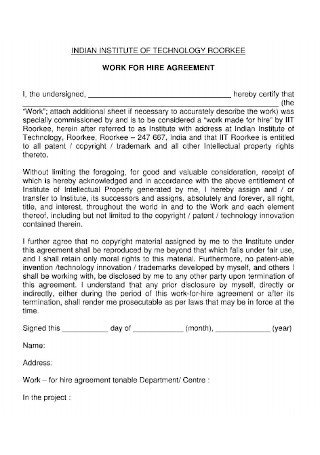
IT Work for Hire Agreement
download now -
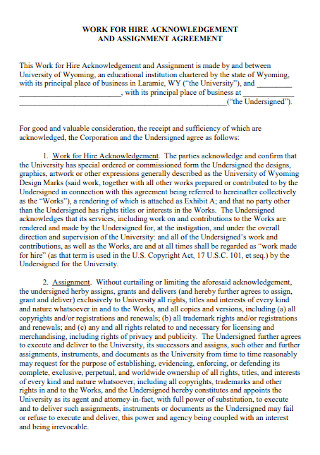
Work for acknowledgement Agreement
download now -
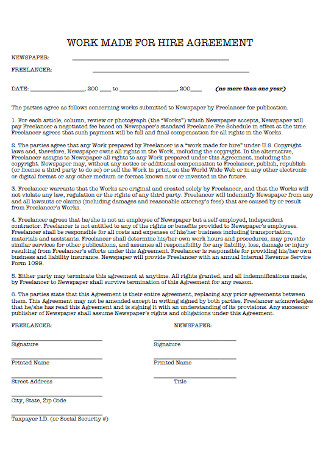
Work Made for Hide Agreement
download now -
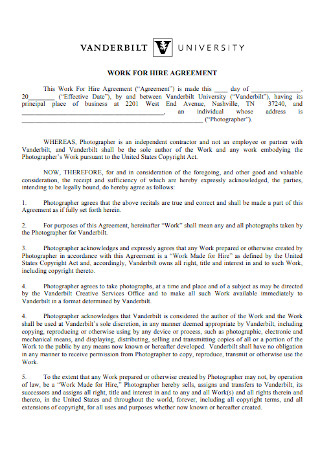
University Work for Hire Agreement
download now -
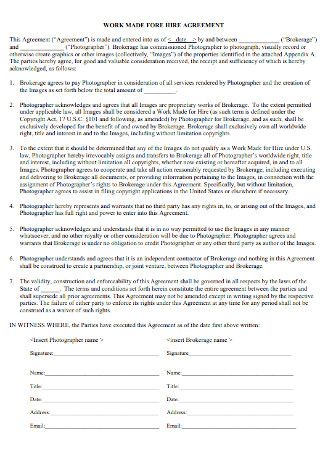
Sample Work Made for Hire Agreement
download now -
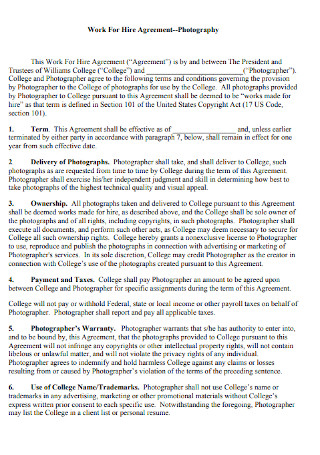
Photography Work For Hire Agreement
download now -
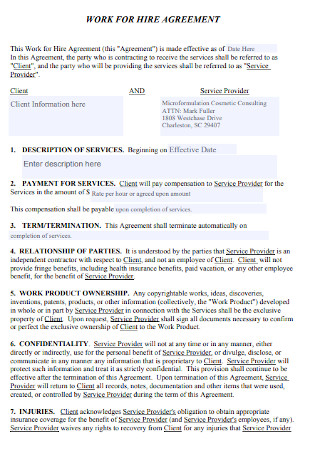
Simple Work for Hire Template
download now -
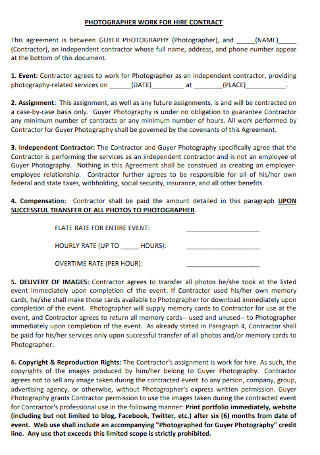
Standard Work for Hire Template
download now -
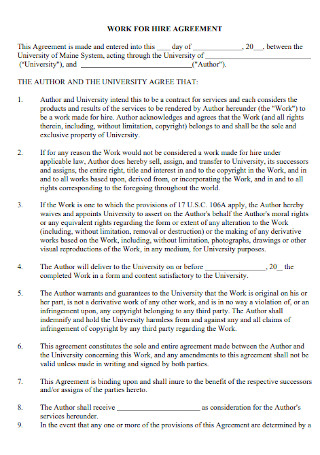
Formal Work for Hire Agreement
download now -
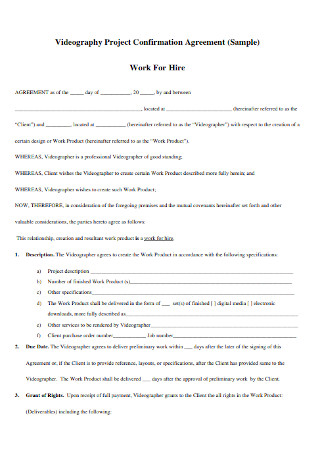
Videography Project Work for Hire Confirmation Agreement
download now -
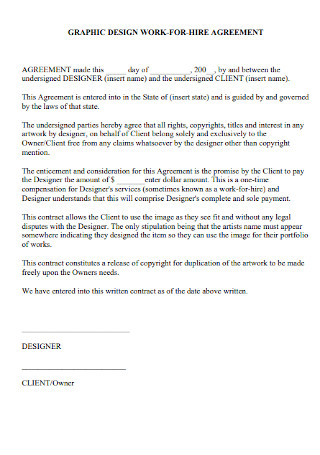
Graphic Design Work for Hire Template
download now -
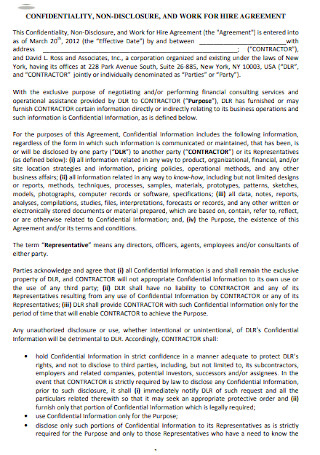
Non Disclouser Work for Hire Agreement
download now -
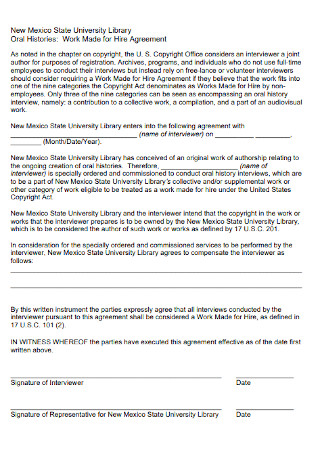
University Library Work Made for Hire Agreement
download now -
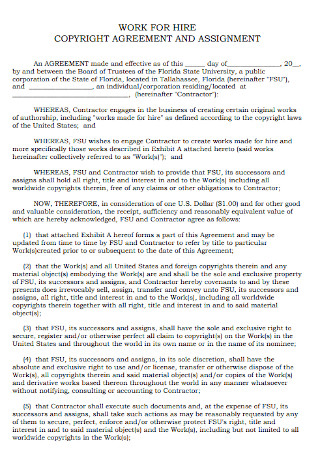
Work for Hire Copyright Agreement
download now -
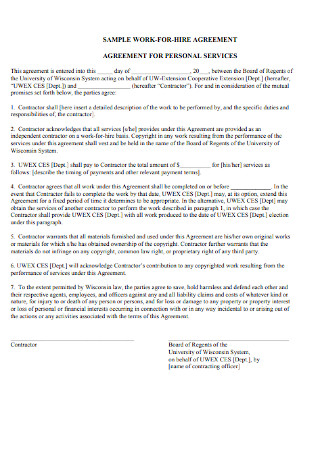
Sample Personal Work for Hire Agreement
download now -
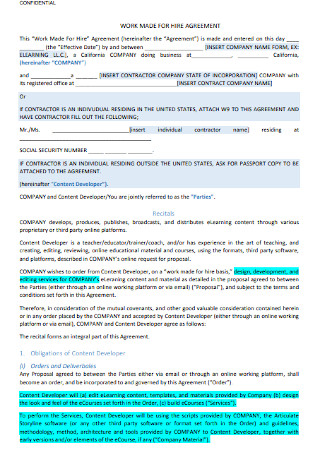
Confidential Work for Hire Agreement
download now -
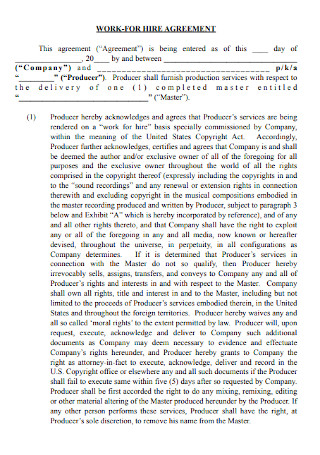
Company Work for Hire Agreement
download now -
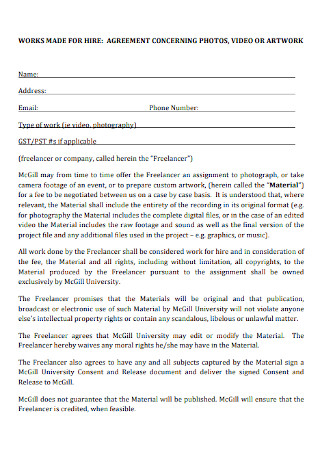
Photos Work for Hire Agreement
download now -
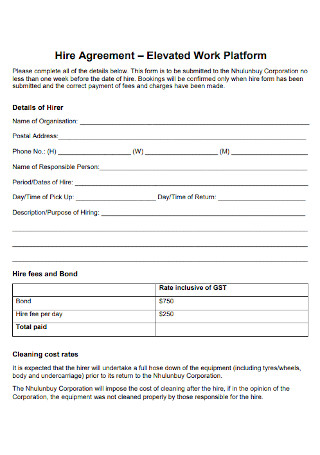
Corporation Work for Hire Agreement
download now -
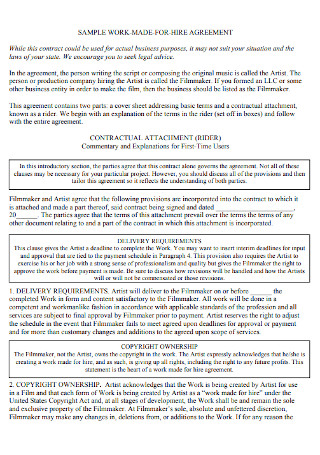
Sample Work for Hire Example
download now -
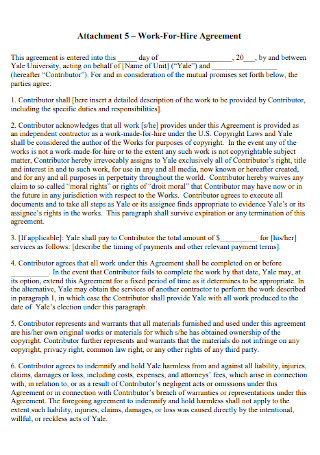
Printable Work for Hire Agreement
download now -
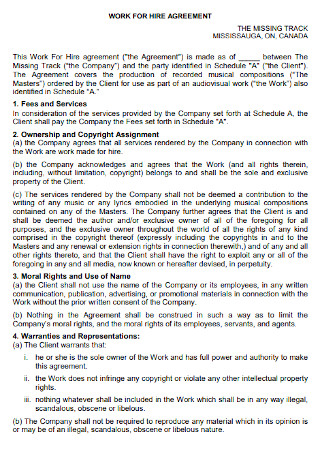
Work Fees for Hire Agreement
download now -
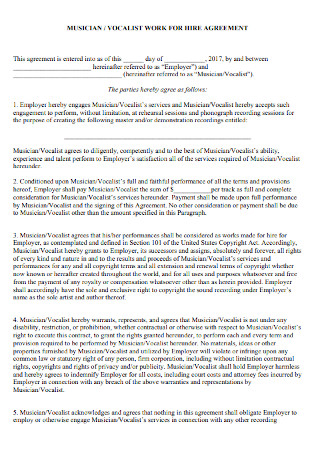
Musician Work for Hire Agreement
download now -
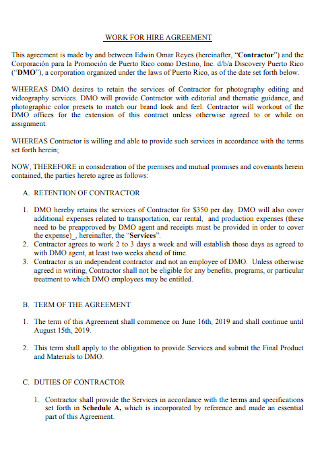
Professional Work for Hire Agreement
download now -
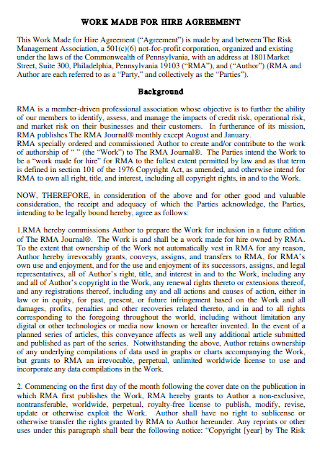
Work for Hire Agreement Format
download now -
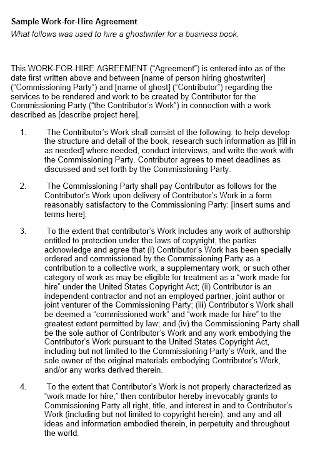
Business Work for Hire Agreement
download now -
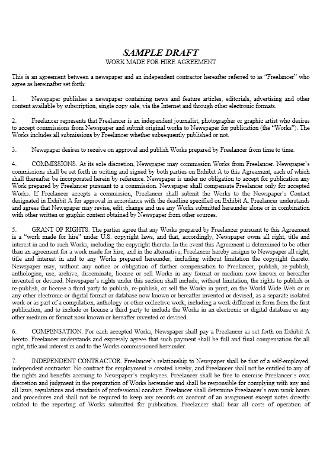
IIndependent Work for Hire Agreement
download now -
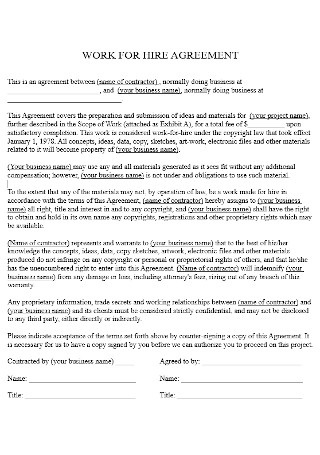
Contractor Work for Hire Agreement
download now
FREE Work for Hire Agreement s to Download
Work for Hire Agreement
What is a Work for Hire Agreement?
Terms You Should Understand Concerning Intellectual Property
How To Correctly Outline a Work for Hire Agreement
FAQs
What are the rights of copyright owners?
What are the exceptions of being a copyright holder?
Can a copyright holder transfer some of his rights?
What happens when a client holds ownership of your work?
Who will own the copyright if two individuals do joint work?
What is a Work for Hire Agreement?
First let us define what the term “work for hire” means, it is any service a person or business provides for another. For example, a writer is working on a copyrighted work such as an article, a book, or website for an online business, or an engineer is creating a patent for a company, or a designer is creating a trademark for a client. According to the U.S. Copyright Office, for copyrights, the employer owns the work of another person he/she has hired, unless an agreement was signed otherwise. The USPTO (U.S. Patent and Trademark Office) states that for patents, the inventor has the right to ownership, but for most employees who work under a company, the patent they make belongs to the company they work for. For a trademark, ownership depends on an agreement between a customer and a designer. Therefore, a work for hire agreement is a contract that decides who has the right to own a copyright, patent, or trademark.
Terms You Should Understand Concerning Intellectual Property
Original ideas and creations such as inventions, written works, and symbols are all examples of intellectual property. An individual or business who owns an intellectual property has the right to use the property and to benefit from it alone, unless an agreement is signed allowing another to use the idea or creation. There are five common types of intellectual property:
How To Correctly Outline a Work for Hire Agreement
To correctly outline a work for hire agreement, it must contain the basics of a standard contract. Every written agreement is different, but below are the steps to create a sample work for hire agreement template.
Step 1: Identify the Parties Involved
Every agreement should identify the parties involved to make the contract legally binding to both the worker and the employer. Other necessary background information concerning the worker should be part of this section of the agreement. Also, don’t forget to appoint the worker’s status in the contract.
Step 2: Decide on Who has the Right to Ownership
The contract should clearly state who has the right to retain ownership of an intellectual property. This part of the agreement is very crucial because the issue can be a reason for conflict between the parties involved in the future. If you own a company, include a statement that plainly says that the ownership of the work belongs to your business, or you can do the opposite in favor of the worker or independent contractor.
Step 3: Detail the Compensation Plan
The contract should address the questions: Who will pay for the product? Who will be receiving the payment? In what form will the payment be? When will the worker receive compensation? These questions are important to emphasize the “work for hire” idea. Also, the agreement must have details concerning the work. What are the materials needed? How will the worker deliver what is expected? When are the deadlines?
Step 4: Incorporate Other Necessary Requirements
If you are temporarily hiring an independent contractor, he/she may need to get insurance. Additionally, a non-disclosure agreement should be included in the agreement, prohibiting a worker from disclosing sensitive information to competitors. Moreover, write penalties for failure to meet the duties and responsibilities written in the contract. Lastly, don’t forget to include arbitration clauses in case disagreements arise later on.
FAQs
What are the rights of copyright owners?
Under the Copyright Act, copyright owners have the right to: reproduce and make copies of his work under protection, distribute and sell duplicates to the public, modify and create new inventions based on the original work, and display the work to the public. These rights permit a copyright holder to be more flexible in commercializing his work for gain. Note that an owner may license or sell any of these rights.
What are the exceptions of being a copyright holder?
Generally speaking, copyrights are usually owned by the author of a new creation, but with some exceptions: (1) If the work is done by an employee who is under an employment contract, the employer has the right to own the copyright. (2) If the creation is done by a contractor and he signs a work for hire agreement, the company or business who hires him will own the copyright if the work: (1) Is a section of a literary work, (2) takes part in an audiovisual creation, (3) is a translation, (4) is only supplementary such as an introduction, bibliography or index, (5) is a compilation, (6) is an instructional statement, (7) is an answer sheet or a test, (8) is an atlas. Lastly, if the author sells the whole copyright of the work, the company who purchases it becomes the property owner or copyright holder.
Can a copyright holder transfer some of his rights?
Yes, a copyright owner can sell or transfer some of his rights to exploit his work. He can choose to transfer some to an individual or a company who will do the marketing for him. As we have mentioned earlier, authors who transfer their ownership rights can recover them after 35 years since its creation.
What happens when a client holds ownership of your work?
When the work you do is under a work for hire contract, the client usually has the right to own your product unless otherwise agreed. When a client owns your work, he has full control of what he wants to do with it. He has all the right to publish and even sell your work to others anytime and anywhere he desires. Unless your client gives you permission, you can’t be involved with your work. The good news is that if an author transferred his copyright work to another, he can still terminate the contract after 35 years under the rule of the U.S. Copyright law. This is protection for all artists whose creations have been profitable for the past years. This right gives the original creator a chance to regain the value of their works.
Who will own the copyright if two individuals do joint work?
When two authors are involved in creating a work with an aim to integrate their efforts into interdependent sections, the creation is regarded as a joint work. In this case, the authors are also considered as owners of a joint copyright. This is common in books or any written work where two or even more authors are involved. Nonetheless, if a written work is mainly created by one author and another only contributes one chapter, then that won’t be regarded as a joint work because the contribution is not interdependent. The U.S. Copyright Office regards owners of a joint copyright to have equal rights unless they make a contract that is contrary.
A work for hire agreement is essential, especially when work involves intellectual property. All inventions and original creations deserve protection because they are outcomes of many efforts on the author’s side. Therefore, an individual or business who wants to acquire some ownership must respect an author or inventor’s rights with the use of a work for hire agreement.
